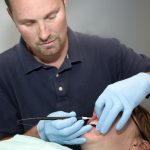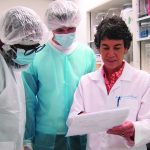
CENTRAL PHARMACY
& CENTRAL COMPOUNDING
CENTER
For more information about these community pharmacy/ education/wellness centers, contact:
Jennifer Burch, PharmD
Sejjal Patel, PharmD
Jhuvon Francis, PharmD
Erika Kelly, PharmD
Chad Palumbo, PharmD
CENTRAL PHARMACY
2609 North Duke Street, Suite 103
Durham, NC 27704
Telephone: (919) 220-5121
Fax: (919) 220-6307
www.centralpharmacync.com
CENTRAL COMPOUNDING CENTER
6224 Fayetteville Road, Suite 104
Durham, NC 27713
Telephone: (919) 484-7600
Call to schedule a consultation with our pharmacists
www.centralcompounding.com
When Jennifer Burch stepped onto her career path, she went into the family business—a common choice. Her father, Bill Burch, was a pharmacist and his pharmacy was a place where Jennifer hung out as a child, making hot fudge sundaes at the pharmacy’s traditional soda fountain. Perhaps less common, however, is her discovery of just how right the choice was for her.
“I may have chosen this career path because it’s the world I grew up in,” she says, “but along the way I found that the evolving role of compounding pharmacy matched my own interests and skills, and that the work of the compounding center—a setting where you knew and spent time with patients—was where I belonged.
“Compounding pharmacists play a special role in medicine,” she explains. “We prepare custom medications for individual patient needs. So, you could say that we are the counterpoint to ‘one-size-fits-all’ medicine.
“Most patients benefit from the extraordinary array of medicines available to them,” she acknowledges. “But not all. For them, we’re able to remove dyes, preservatives, or other irritants or to reformulate medications into liquids, creams, or other forms. Using transdermal preparations we can bypass sensitive GI tracts; special dosages permit gradual increase or decrease of medications; and varied flavors make meds tolerable for children and pets.
“In other words, our job is to make the adjustments necessary to enable patients to use the medications they need. And, frankly, it’s the creative, fun part of pharmacy.”
Pharmacy and Education:
A Family Tradition
Dr. Jennifer Burch grew up in what was to become the family business, hanging out as a child in Center Drugstore in Durham, her father’s place of business. It was a traditional old pharmacy with a lunch counter and a soda fountain.
Several years later, her father, pharmacist Bill Burch, established Central Pharmacy and, in 2002, added a stand-alone Central Compounding Center.
In 1993, when Jennifer received her doctoral degree from Campbell University’s School of Pharmacy, she and her father formed an alliance that has had a major impact on pharmacy education and practice throughout the state.
“My dad and I saw patient education as a major responsibility of the pharmacist,” says Dr. Burch, “and as a consequence we established a series of education programs that continue today—for patients with diabetes, asthma, heart problems, and particularly for those who can benefit from bioidentical hormone replacement therapy.”
Lifelong Learner
However, notes Dr. Burch, “the education programs we’ve developed, began with a pretty serious investment in self-education. Our work on hormone replacement therapy is a good example. The learning curve began in the late nineties when we began compounding hormones. I remember going to seminars on hormone therapy and realizing how much they didn’t teach you in pharmacy school about hormones.
“I remember that my Dad returned from a conference on hormone replacement therapy and told me I needed to go to one of these conferences, telling me: ‘These women don’t want to talk to me about hormones. They want to talk to you about hormones.’
“So, I became a student. I probably averaged three or four webinars at night after work—for weeks. And I’ve logged hundreds of hours of continuing education in the years since. And that continues—it has to. Hormonal imbalances are extremely complex conditions, in which a variety of factors contribute to the patient’s symptoms. Teasing out the precise nature of the imbalance—and its cause—is essential. As is understanding the importance of bioidentical hormones and how to adjust and administer them. You have to keep learning.”
Changing Role of the Compounding Pharmacy
“We’re practicing in an information age,” notes Dr. Burch, “an age that is changing understanding about health and about the practice of medicine, and it’s certainly changing the role that pharmacists play—especially compounding pharmacies.
“For one thing, medicine is moving—gradually, but steadily—down the path toward personalized medicine. And it seems to me that compounding is at the heart of that evolution.
“Despite the extraordinary range and variety of standardized commercial medications it’s still challenging to match patients and pills,” she says. “Not everyone needs the same dose; people metabolize things differently; and diets, ailments, genes, and age are among many factors that alter how we respond to medications. So, while it’s likely that drugs of the future will be targeted much, much more specifically. Compounding allows us to address many of those individual needs right now.”
Hormone Replacement Therapy
“If I’ve learned one lesson in my career,” says Dr. Burch, “it’s that being a lifelong learner is part of being a good pharmacist. You’ve got to keep learning.”
That’s because, she says, the work of a compounding pharmacist has changed significantly—focusing increasingly on areas that demand continuing education as well as patient education. Among these is the field of hormone replacement therapy.
“Better understanding of the role hormones play in balancing our health, has led to an appreciation of the benefits of adjusting hormone balances medically,” she explains. “And this is definitely work for compounding. Not only do medications need to address imbalances for each individual, but hormone replacement therapy has to be flexible, adjusting over time and in response to the patient’s experience.”
Comprehensive hormone testing and monitoring is a critically important part of this process, says Dr. Burch, because it allows for accurate hormone adjustments. “The hormone testing protocol at Central Compounding Center is comprehensive,” she says, “including measuring levels of all hormones. After the initial test, an abbreviated test three months later may be needed for some hormones; and an annual recheck is recommended.
“Accurate testing is especially important,” she adds, “because symptoms of may be misleading; the same symptoms could signal low levels of one hormone or high levels of another. So, we don’t make assumptions, we test.”
Following testing, Dr. Burch works closely with physicians, making recommendations about how to balance hormones, as well as providing specialized treatments.
CBD and Supplements
The educational role for compounding pharmacies has grown enormously in the years since I’ve been practicing,” says Dr. Burch. That’s due in part to the range and variety of non-prescription therapies available—including OTC medications, supplements, and the many ‘cures’ offered by ‘Dr. Google.’ And patients themselves are more involved than ever in seeking non-prescription remedies for their ailments.
“Helping patients navigate this overload of information and exposing myths and misinformation has become an increasingly important role at Central Compounding,” says Dr. Burch.
“Supplements—such as vitamins—are another topic about which I discovered I needed more information,” she recalls. “First, because patients came in asking about them, and second because they didn’t teach about them in pharmacy school. So there’s a tremendous need to help people by steering them towards quality products, helping them understand dosages, and explaining interactions with medications. Quality is the primary consideration in choosing what we stock at the pharmacy.”
Another subject Dr. Burch has needed to master, is the use of cannabidiol (CBD) products. “Since approval for over-the-counter sale in North Carolina,” she says, “CBD has been widely used as an alternative, non-pharmaceutical treatment for conditions including pain management, sleep regulation, and a range of mood disorders. “However, its effectiveness depends on guidance and education,” emphasizes Dr. Burch, “and we have learned the importance of careful, individualized dosing, and of the quality of the product. The hemp plant is much like a sponge. So, you don’t want to use CBD from hemp planted in toxic soil. We carefully vet all products to ensure they have the appropriate level of CBD and are not contaminated with pesticides, herbicides, or heavy metals.”










